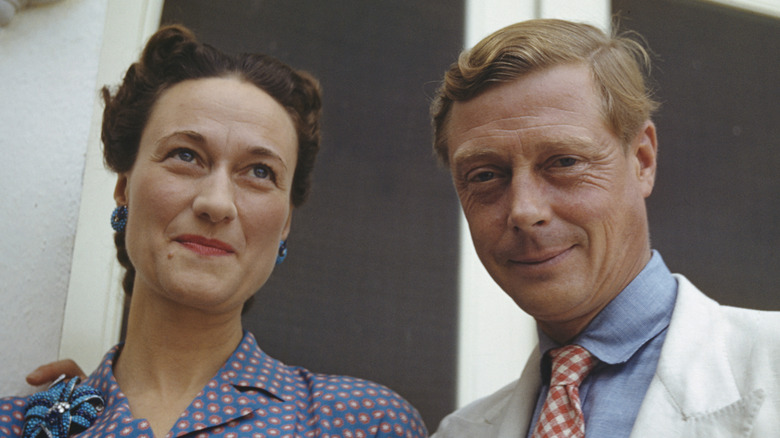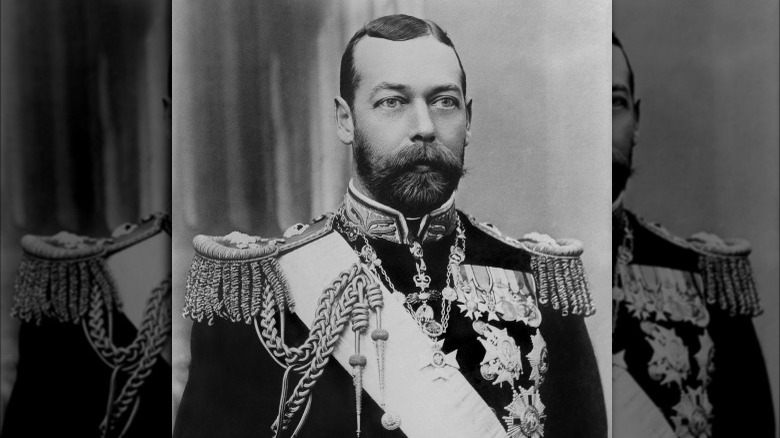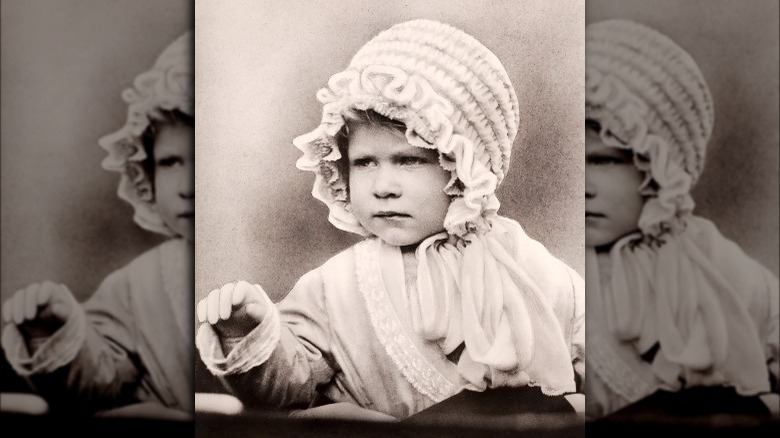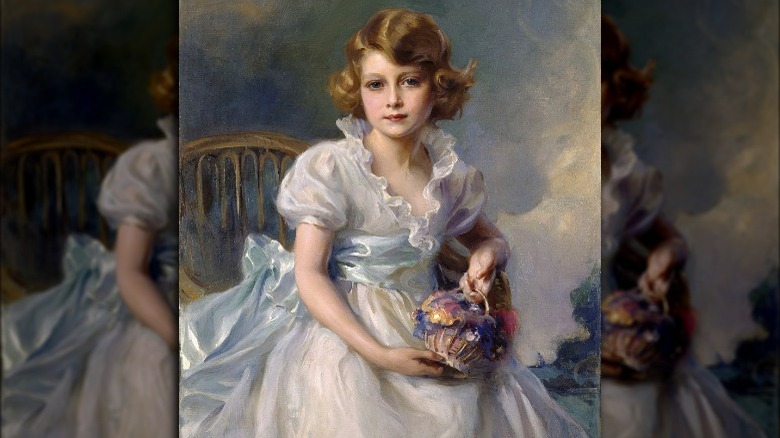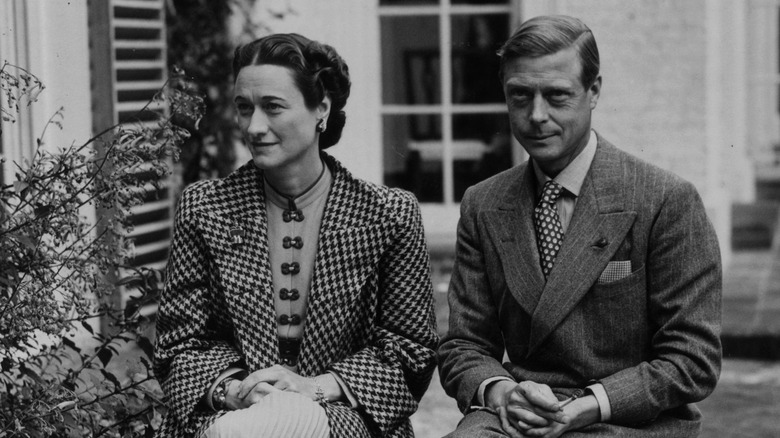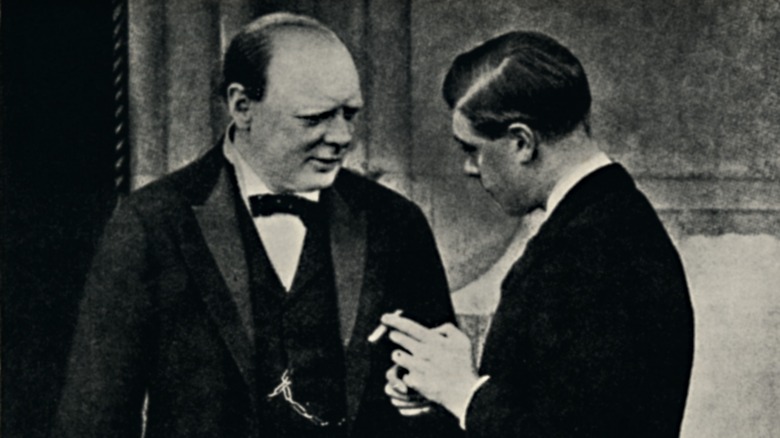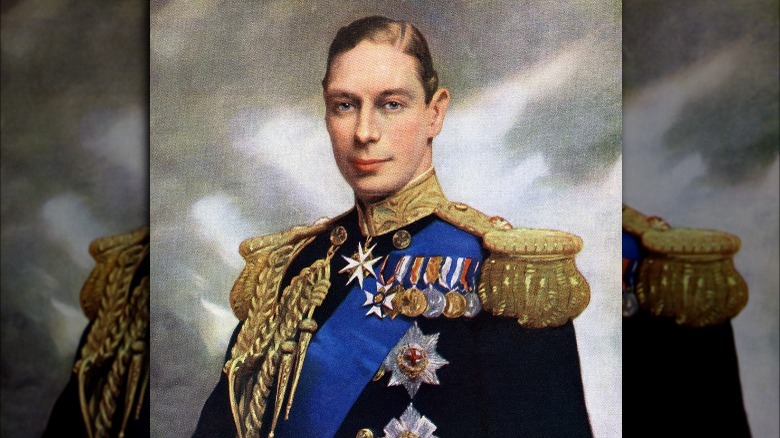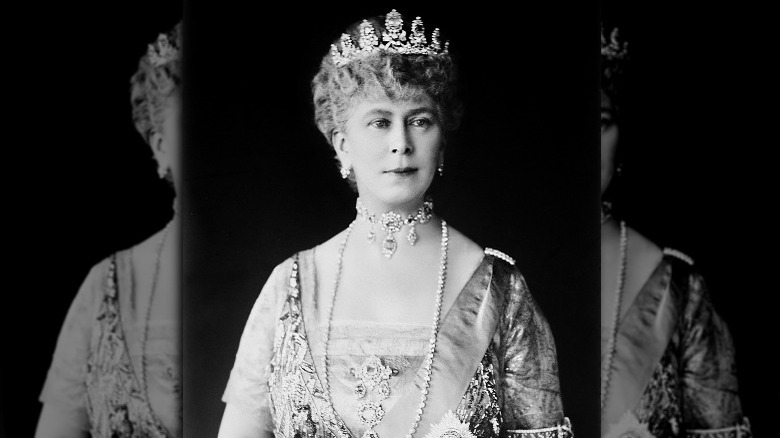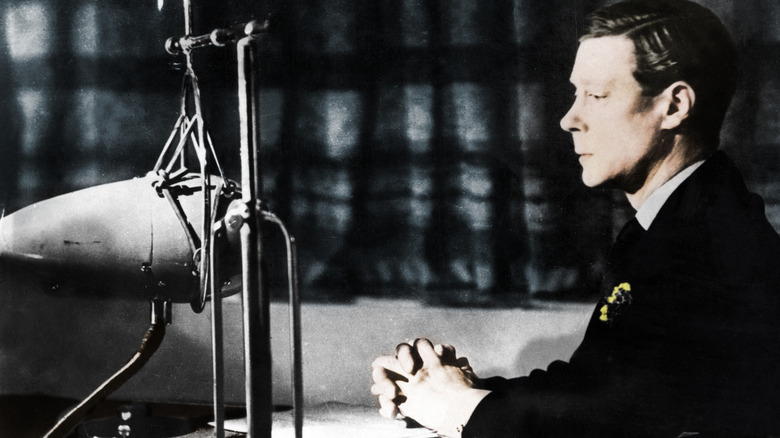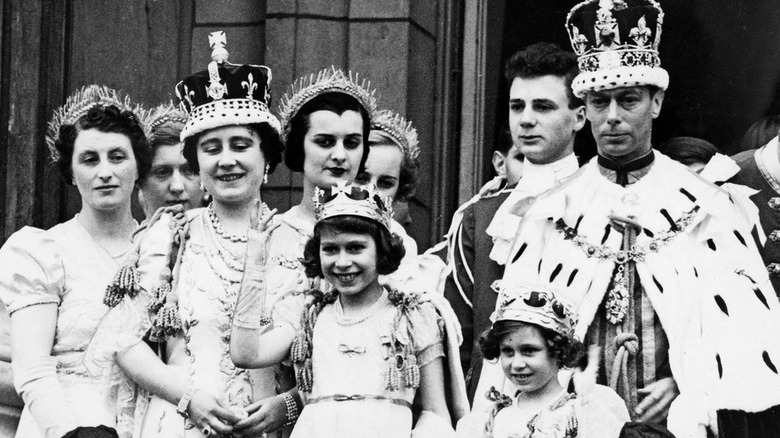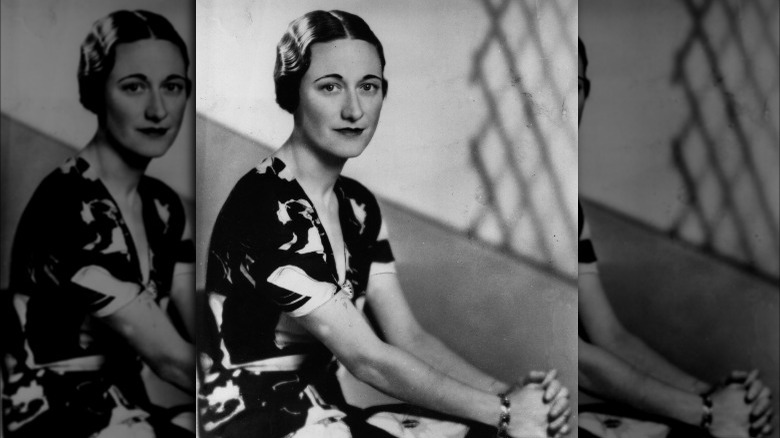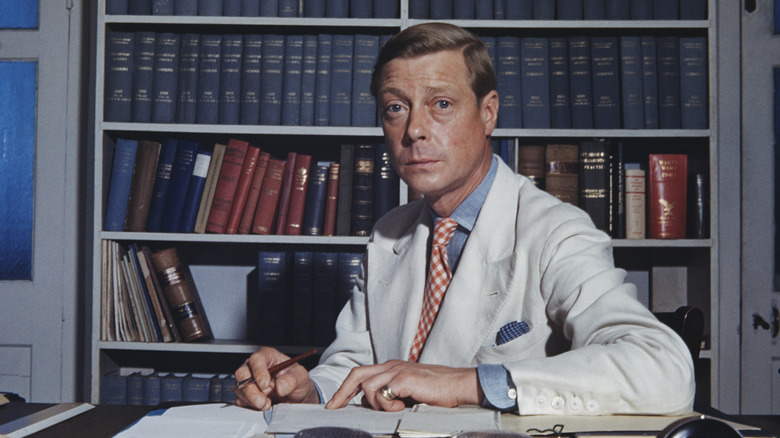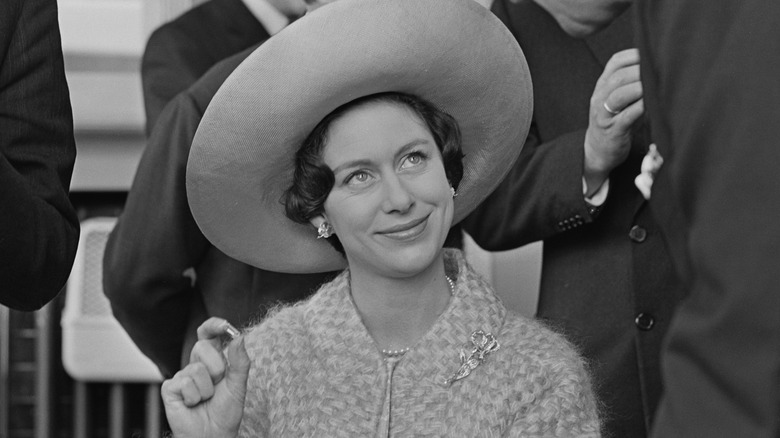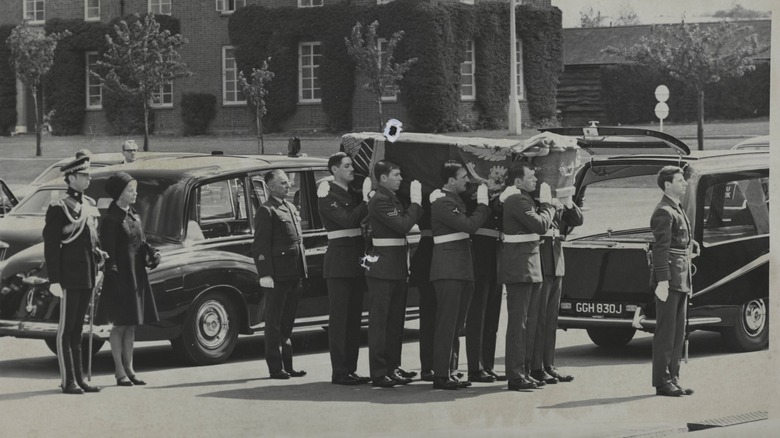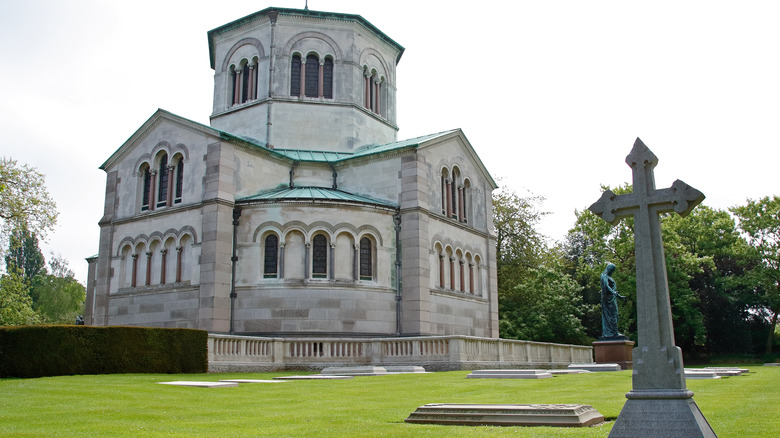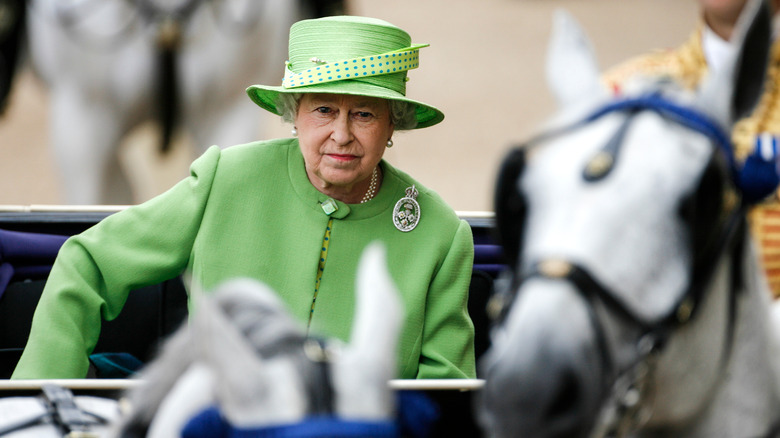What The Royal Family Really Thought About Edward VIII's Abdication
"Abdication" isn't really a word that gets used much in royal circles. Everyone wants to be a monarch, right? Who would give up the chance to live in a palace, tell everyone what to do, be bowed to, have a huge salary, and ride horses around the countryside with an entourage?
Being king or queen, though — even when you're just a figurehead — isn't really about any of those things. Well, it is sometimes, but mostly it's just a lot of responsibility. Sure, you're not really making any critical decisions, but there are always a million things to sign, speeches to give, people to meet, and kingdom tours to embark on. But the worst part about being a monarch — especially a British monarch — is that (at least up until very recently) your major choices in life aren't your own. You don't get to pick your spouse, you don't get to choose your career, and you don't get to do and say what you want. Everything is about protocol and rules, and anyone who doesn't abide risks losing his or her title and everything that goes along with it.
One monarch, though, didn't follow all those rules. He did what he wanted, and he paid the price — which wasn't just the loss of his royal title but the loss of all his family relationships, too. And the royal family wasn't exactly mum about their opinion, either. Here's what the British Royal family really thought about the abdication of King Edward VIII.
King George V saw it coming
Not every royal family has a great parent-child dynamic, but parents usually do have some insight into their children's personalities and suitability for certain lines of work that not everyone else can see. King George V had five sons; David was his oldest son and heir and Albert was next in line. British kings, by the way, like to confuse people by choosing different names when they become king, which is why David is remembered as King Edward VIII and Albert later became George VI, though the current Queen Elizabeth kept her birth name.
George V's biographer described him as having "no exercise of social gifts" and "no intellectual powers" (via the BBC), but he did have good instincts, and he seemed to not only be aware that his eldest son David wasn't fit to be king, but that he'd give it up when it proved too much for him.
In 1929, George V was visiting with his younger son and granddaughter (the future Elizabeth II) while recovering from lung surgery. "You'll see," he told his son. "Your brother will never become king." He also told an associate that his oldest son would abdicate — in those exact words. No one believed him, of course, but it probably wouldn't have really saved them much trouble if they had.
Everyone had a hunch Elizabeth was going to be queen
At the age of 35, David was unmarried and had no children. According to "Before Wallis – Edward VIII's Other Women" (via the Sydney Institute) there had been a flicker of hope back in 1917, when David fell in love with a nurse named Rosemary Leveson-Gower. But Rosemary wasn't just a nurse, she was also the daughter of the Duke and Duchess of Sutherland, which means she met the official royal standards for a suitable bride and future queen. But David's mother, the distant and difficult-to-please Queen Mary, forbade the marriage, mostly because she thought Rosemary's family seemed a little too eccentric. Mary probably never imagined that David wouldn't bother looking for another bride that met the royal standards, though why would he, really. If the near-perfect Rosemary wasn't enough to satisfy his family, probably no one would.
As it became clear that David wasn't going to find the right woman, it looked like the still very young Princess Elizabeth would become his heir. Even if George V was the only one in the family predicting abdication, everyone else at least had enough foresight to start preparing the princess for her future role as queen. Meanwhile, even the press was starting to connect the dots. In 1934, an American report noted David's "lukewarm" feelings about being king (via the BBC), and referred to the princess as the person "in direct succession to the crown of England."
Elizabeth prayed for a baby brother
As it turns out, not wanting to be the monarch is kind of a thing in the royal family. When Edward VIII abdicated, the future Queen Elizabeth was only 10 years old—old enough to understand what that meant for her but still very much a little girl. Everyone likes to talk about how stoic she was, but that doesn't necessarily mean she was okay with the way events were playing out.
In one story, the princess told her 6-year-old sister Margaret that their father was going to be king. When Margaret asked if that meant Elizabeth would be queen someday, Elizabeth replied, "Yes, I suppose it does."
That story doesn't actually prove anything except how British everyone was, but people like to cite it as proof that even at 10 years old, Elizabeth was a model future monarch. In reality, though, she may have been a bit more shaken up than she let on. According to the BBC, not long after the abdication, Elizabeth's grandmother remarked that the princess had been "ardently praying for a brother."
What Royal Marriages Act of 1772?
Most Americans think monarchs can do whatever they want, because most Americans spent the first three seasons of "Game of Thrones" wanting to punch Joffrey Baratheon in the face. For a while, the newly-named Edward VIII thought he could do what he wanted, too. In fact, there was even precedent for it — according to History Extra, the Royal Marriages Act of 1772 basically gave him permission, in writing, to marry whoever he wanted to as long as she wasn't a Roman Catholic, which granted is a pretty weird thing to still have on the books in 1936, but okay. Wallis Simpson, the woman he loved, was American and divorced but she was most definitely not a Roman Catholic.
Unfortunately for the couple, royal protocol was not on their side. Sure, it was technically possible for him to marry anyone he wanted, but it was also in the power of the prime minister to say no. And that's just what then-prime minister Stanley Baldwin did, reasoning that the public wouldn't want a queen who had been previously divorced.
It wasn't just the prime minister, though — no one in the family wanted to see the King married to a divorcee who was also — shudder — an American. It was either Wallis or the crown, which the family probably thought was a no-brainer. And it was, but not in the way they expected.
Winston Churchill was on the king's side
Winston Churchill was not a royal, so he could look at the situation from a very different perspective than Edward's mother and siblings. According to History Extra, he even went so far as to say that he thought Edward and Wallis were good for each other. "No companionship could have appeared more natural, more free from impropriety or grossness," he said. Churchill also knew that a marriage between the King and an American divorcee would be politically tricky, so he worked with a couple of Lords on a plan that would have allowed Wallis to marry Edward but not become queen. Instead, she would be the Duchess of Cornwall, and everyone would live happily ever after. Or something.
It seemed like a pretty simple solution, but as far as the rest of the royal family was concerned, you know, forget it. They had always disapproved of Wallis (via History) but according to Vanity Fair, Albert, in particular, thought Wallis was "dominating," which is not really a quality you want in a king's consort. On the other hand, a royal mistress wasn't exactly a novel concept and it's probably safe to say they just kind of hoped he'd get tired of her — right up until the moment when Edward declared the couple's intention to marry.
Albert didn't want to be king, either
Just in case you still aren't sure you believe that not everyone wants to be king, there was a third person in the royal family who most definitely did not want to be king, and that was Edward VIII's younger brother Albert. According to Vanity Fair, when Albert got wind that his older brother might throw away all of his royal responsibilities and his duty to his country for love (of all things), it was hard for him to believe what was happening. Every member of the royal family was raised to understand that duty to Britain came first, before anything else, and the idea that his brother was willing to betray everything he'd been brought up to believe was almost beyond comprehension.
After he'd had a little time to think about it, Albert moved on to feeling personally betrayed. As the second son, he never expected to become king and it was not something he'd ever wanted, either. He was afraid of taking on the monumental responsibility, which he felt wasn't his and was going to be dumped unfairly on his shoulders. And, if Edward abdicated, any children he might have would be excluded from the succession (via History), so not only would Albert be the next king, but his oldest child would be next in line after him. So it wasn't just Albert who had been betrayed, but Elizabeth, too.
The Queen Mother's poorly executed last-ditch effort
Edward's mother — Mary of Teck — was not known for her motherly intuition or for her displays of parental affection. In fact, according to writer/researcher Rebecca Starr Brown, she'd never actually been alone in the same room with either one of her two older children, so let's just say that she wasn't especially maternal. She did, however, expect her sons to do what she told them to do, even the one who was her king and sovereign. When she got word that Edward was planning to abdicate, she asked him to reconsider. Not because of royal duty, exactly, but because she wanted him to think of what the crown might do to his poor, ailing brother.
She must have thought she was being persuasive, but as Starr Brown noted, her "think of your brother's happiness" argument must have seemed extra callous to Edward since she clearly wasn't thinking about Edward's happiness. At that point, though, he was pretty much beyond persuading anyway. He'd already made up his mind, and Mary was just making it easy for him. Mary, for her part, was enraged that her last-ditch effort to change his mind had fallen apart, and she would later call the family's farewell gathering just before her son's final departure "too pathetic for words."
Still more people who didn't want to be monarchs
Edward didn't want to be king, Albert didn't want to be king, Princess Elizabeth didn't want to be queen, and Albert's wife Elizabeth wanted none of it, either. According to the documentary "The Queen Mother: The Reluctant Queen" (via Latin Times), Albert was so distraught to learn he would be king that he cried for an hour after he found out. That must have contributed to Elizabeth's (who became "Queen Mother" after the succession of her daughter) furious feelings towards her brother-in-law, which she never did let go of.
Edward was the first monarch in British history to give up the throne voluntarily, so even though everyone knew intellectually that it was possible, they probably never thought it would actually happen. Now, to be fair, other British monarchs have also abdicated, but they were all forced to do it, either because of war or because no one really liked them.
That probably wasn't the driving force behind Elizabeth's ire, though. Like King George V and her mother-in-law, she felt her husband was too frail to be king. He'd never been especially healthy (via the BBC), and even his own wife thought he would crack under the pressure. Edward, though, was equally as unmoved by Elizabeth's ire as he had been by his mother's, and on December 11, 1936, he made his infamous abdication speech to a stunned nation.
George VI never forgave his brother
Albert became George VI, and he never really found it in his heart to forgive his older brother. Edward (back to David, again) married Wallis on June 3, 1937, and according to the History Press, he seems to have harbored at least some hope that his family would come to the wedding. Instead, he got crickets. No one from the royal family showed up. In total, there were only seven people present and the ceremony took just 5 minutes (via Time). Not much of a royal wedding, but then, neither Wallis nor David was technically royal.
It's hard to say whether any of David's siblings would have attended the wedding under different circumstances. They were British, after all, which means putting on a brave face was not really that much different from putting your socks on in the morning. But according to History Extra, George VI actually forbade them from attending the wedding, so the empty chapel was basically a royal decree.
Wallis didn't get to be an HRH, either
"HRH" is short for His/Her Royal Highness, but not everyone in the royal family gets to be called HRH. The title is bestowed upon the children of a monarch, and also the grandchildren of a monarch but only the ones descended from the male line (via Royal Central). Traditionally, the spouses of an HRH also get to be an HRH, but not Wallis.
George VI seems to have spent a lot of time dreaming up all the different ways he could get back at his brother and his new bride. First, there was the wedding boycott, and then he sent word that Wallis was absolutely not to be addressed as "Her Royal Highness" (via History Extra). Instead, she would just be the Duchess of Windsor. David himself (who was created Duke of Windsor after the abdication) still got to be an HRH, but it must have stung a bit that the arrangement was basically the same thing that Winston Churchill had planned for the couple while David was still king (he got to keep his title and Wallis did not), except he ended up having to abdicate anyway.
For years, the Duke of Windsor had no royal duties
At some point, David probably resigned himself to the fact he wasn't going to get his family's love back, but according to History Extra, he never stopped hoping they'd at least give him a job. He kept asking and getting turned down, and it sounds like the family's reasons were more about paranoia than anything else. Court gossips were whispering that the only reason the couple wanted to come back was so Wallis could make herself a problem for the royal family. Horace Wilson, a senior official in the British government, even went so far as to say he thought Wallis was scheming. "It must not be assumed," he said, "that she has abandoned hope of becoming Queen of England."
Four years after the abdication, David finally got his hoped-for assignment — he became Governor of the Bahamas. According to historian Carolyn Harris, though, it wasn't because the royal family had forgiven him, it was because they needed to get him out of Europe. After all, just a couple of years earlier he and Wallis had visited Germany as guests of Adolf Hitler, and there was some concern that Hitler might try to conquer England and make Edward VIII his puppet king. So at the time, it seemed like a good plan to move David to the Bahamas, where Hitler would have a hard time getting at him. The appointment was a short one, though, and by 1945 David and Wallis were on their way back to Europe.
Poor Princess Margaret
The Queen's sister Margaret had many woes that traced directly back to the abdication. After the whole unpleasant debacle was over, it's probably safe to say no one wanted to admit mistakes had been made or people had been treated unfairly, because that would mean it had all been for nothing. In order to maintain this air of certainty, then, there was no way the royal family was going to tolerate similar behavior anywhere in its ranks.
So when Princess Margaret fell in love with the handsome but divorced Group Captain Townsend in 1953, the relationship was pretty much doomed right out of the gate. In 17 years, no one in the royal family had changed their opinion about divorcees. According to the New York Times, Margaret was bluntly informed that if she married Townsend, she'd have to give up her royal titles and income and leave England for at least five years, pretty much exactly as her uncle had done.
To her credit, though, History says the Queen did try to come up with a plan that would have allowed the marriage to go on. It was eerily similar to the one devised by Churchill for Edward VIII — Margaret would have to remove herself and any children she had from the succession. No one is really sure why the idea died, but Margaret eventually broke off her relationship with Townsend, citing "duty to the Commonwealth," among other things.
Don't let the door hit you on the way out
David may not have really understood just what the abdication would mean to his family. According to Rebecca Starr Brown, he misconstrued the polite telegraph Mary of Teck sent on his wedding day — he thought it was a sign of forgiveness, but for Mary, it was just a British thing to do. As the years wore on, it became clear that Mary's anger at her eldest son wasn't waning. In the first 10 years after the abdication, he saw her only once and just for a few minutes. In 1946, she finally conceded to a one-week visit, but upon David entering the country, there was no welcome from members of the royal family, just one car with an anonymous chauffeur. Not much happened during that visit, either. David apparently met with the king, too, but there was no royal reconciliation. He saw his family in England only two more times: for George VI's funeral and for his mother's.
David did see his niece, Queen Elizabeth, just before he died in 1972. According to Good Housekeeping, he met with her for a few minutes while on his deathbed in Bois de Boulogne, Paris. He was very sick but still determined to pay respects to the woman who wore the crown that was supposed to be his. Despite his poor health, he got up out of bed and bowed. He died just 10 days later.
No one will ever again be styled 'Duke of Windsor'
Wallis Simpson outlived her husband by 14 years and was buried next to him in 1986. Over the years, their relationship has been portrayed as everything from an epic love story to a seedy tale of dishonor and selfishness. There was also that whole Nazi sympathizer thing that happened in 1937, which by the way wasn't just one meeting with the Führer, but a series of comments along the lines of "it would be a tragic thing for the world if Hitler was overthrown."
Anyway, according to British Heritage, after the whole ugly abdication chapter of the Windsor family story wrapped up with the death of the former King Edward VIII, the Queen declared that the title "Duke of Windsor" would never be bestowed upon anyone ever again. This was not out of respect for her deceased uncle, it was because it came with way too much baggage.
Now, let's forget for a moment that the fourth Duke of Norfolk plotted to have Elizabeth I assassinated so he could marry her cousin Mary and become king (via the National Portrait Gallery), and no one ever declared "Norfolk" to be an unsuitable title, but never mind. Ultimately, it's up to the Queen who gets to have what royal title, and the Queen is very much not in favor of ever having another Duke of Windsor in or out of Britain.
The abdication could be the reason why Elizabeth II is still on the throne
Queen Elizabeth II is pretty old. She's so old that her heir, Prince Charles, is also an old man and will be even older by the time he sits on the throne, if that day ever actually comes. His mother is Britain's longest-reigning monarch, and she's really not showing any signs of slowing down.
That hasn't stopped people from gently suggesting that maybe, just maybe, she should retire from the throne and give Charles a chance to be king. The Queen, though, has been pretty clear about her intention to die on the throne — according to Town & Country, she told a cousin that she would not abdicate "unless I get Alzheimer's or have a stroke."
Now, Elizabeth has never come out and said that her determination to remain queen has anything to do with her uncle's abdication, but there's certainly been some speculation. According to Reuters, "royal watchers" think the word "abdication" might be a bit of a sore spot for the royal family, and it could be that Elizabeth just won't ever bring herself to go there, no matter how tired she gets. The Queen has declared on more than one occasion that being a monarch is a "job for life," which besides being a promise also seems just a tiny bit like a vague criticism of her deceased uncle.
